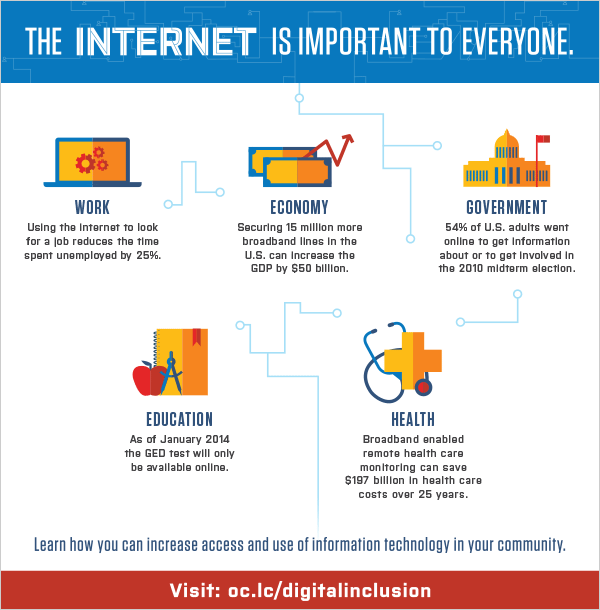
The Internet is Important to Everyone [Digital image]. (2013, September 18). Retrieved June 27, 2016, from https://www.webjunction.org/news/webjunction/digital-inclusion-infographic.html
The diffusion of the internet and ICTs means communities and organizations have the opportunity to expand and enrich their services, with the possibility of leveraging greater connectivity to serve the public good. Increasingly, basic services and essential goods – such as education, employment, commerce, and social interaction – are accessible through ICT or internet platforms. The potential for these technologies to aid in positive social impact is high. However, the reality is that many individuals, and even whole communities, are overlooked, forgotten, or excluded.
As a result, these underserved populations – often those less educated, with lower incomes, seniors or individuals with disabilities – are not only missing out on the potential benefits of ICTs, but also not being engaged in important decisions related to digital initiatives within communities. The Center for Digital Inclusion at the iSchool recognizes the importance of a digitally inclusive community. Our research projects reflect the ways we are helping to raise awareness and engage in scholarship around digital inclusion.
For more information about Digital Inclusion, please visit:
- Nonprofit Technology Network http://www.nten.org/
- WebJunction https://www.webjunction.org/explore-topics/digital-inclusion.html
- National Telecommunications & Information Administration https://www.ntia.doc.gov/
- National Digital Inclusion Alliance http://www.digitalinclusionalliance.org/
Footnotes:
1 Definition from Building Digital Communities: A Framework for Action, from https://www.imls.gov/assets/1/AssetManager/BuildingDigitalCommunities_Framework.pdf



